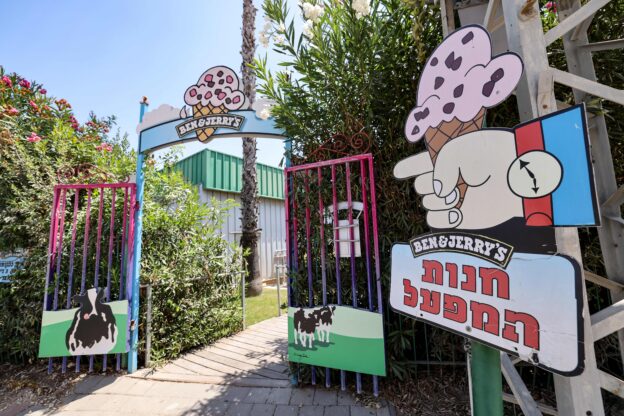Indigenousness is in the eye of the beholder
In an irony as rich as premium full-fat ice cream, Ben & Jerry’s, the frozen confection company that objected last year to its product being sold in indigenously Jewish land, found itself melting under consumer heat for asserting the rights of Indigenous Americans.
On the Fourth of July, the company posted a video on social media to celebrate “National Ice Cream Month.” (Now, that one’s definitely going on my calendar, though I’ll opt for a cholov Yisrael brand.)
But Ben and Jerry’s seized the opportunity, in line with its declared exquisite social conscience, to inform ice cream aficionados that “it’s high time we recognize that the US exists on stolen Indigenous land, and commit to returning it.”
The campaign was elaborated upon on Ben & Jerry’s website, which explained that its “land back” stance was about “ensuring that Indigenous people can again govern the land their communities called home for thousands of years.” It focused mainly on the taking of land, including Mt. Rushmore, from the Lakota tribe in South Dakota.
Oddly, though, Messrs. Cohen and Greenfield – the Ben and Jerry who founded the company in the 1970s – seemed less enamored of indigenous rights last year when they blasted the brand’s parent company Unilever for selling the franchise’s operations in Israel to a local licensee, which allowed the stuff to be sold in Yehudah and Shomron, in the ice cream kings’ view, “occupied territories.”
Those territories are “occupied,” in their view, by the evil colonizer Israel. But, whatever one’s thoughts about the future political status of those areas, from the standpoint of actual history – which seems important to Ben and Jerry – it is myopic to see them as indigenously Arab.
On the contrary, the only readily identifiable people today who have true historic claim of descent from the land’s most ancient inhabitants are Jews.
There are no Cna’anim left today. They were vanquished in Yehoshua’s time. With all due respect (what little is due) to P.A. President Mahmoud Abbas, who told the U.N. Security Council in 2018 that “we are the descendants of the Canaanites that lived in the land 5,000 years ago,” not only is his claim nonsense, but it’s also one that, tellingly, no Palestinian Arab (himself included) ever made over centuries. Mr. Abbas was trying to invent an imaginary indigenousness. Nice try, Mahmoud.
When the Jews who lived in the land since Yehoshua’s time were forced to leave it, something that we Jews have lamented for all the centuries since and focus on in particular these days every Jewish year, those who subsequently took up residence in Eretz Yisrael were the occupiers.
That includes the “Palestinians,” many of whom are in reality descended from successive waves of people who came to the area only at the end of the 18th century from places like Egypt, where famine and persecution fueled emigration; and, in the 19th century, from Algeria, Transjordan and Bosnia. So much for Arab indigenousness in Eretz Yisrael.
In the end, Unilever sold its Ben & Jerry’s division to another company that has rights to sell products in Israel and the territories overseen by the Palestinian Authority. Ben and Jerry were not happy. “We continue to believe it is inconsistent with Ben & Jerry’s values,” they tweeted, “for our ice cream to be sold in the Occupied Palestinian Territory.” They got licked.
And aren’t likely very happy now, either. Because many American consumers were apparently less than enthusiastic about the boys’ recent proposal that the nation be transferred to descendants of Native American tribes and go from being the United States of America to the Disunited Tribes of America. Ben and Jerry’s parent company lost nearly $2 billion in market capitalization in the wake of their July 4 message.
And adding sprinkles to the rich ice cream irony is an inconvenient fact of American history.
Before the establishment of the Republic, the Abenaki – a confederacy of various Indigenous tribes that united against a rival tribal confederacy – controlled an area that stretched from the northern border of Massachusetts in the south to New Brunswick, Canada, in the north, and from the St. Lawrence River in the west to the East Coast.
Ben & Jerry’s headquarters are located in a business park in southern Burlington, Vermont. Well within the western portion of Abenaki territory.
Delicious.
© 2023 Ami Magazine
